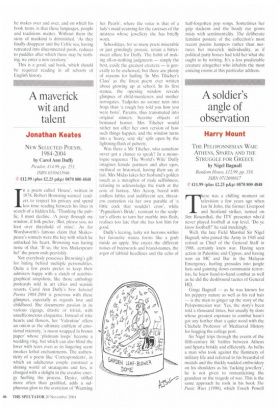A maverick wit and talent
Jonathan Keates
NEW SELECTED POEMS, 1984-2004 by Carol Ann Duffy Picador, £14.99, pp. 253, ISBN 0330433946 t £12.99 (plus £2.25 p&p) 0870 800 4848 1 n a poem called 'House', written in 1874, Robert Browning warned readers to respect his privacy and spend less time reading between his lines in search of a hidden life. 'Thanking the public, I must decline. /A peep through my window, if folk prefer; /But, please you, no foot over threshold of mine'. As for Wordsworth's famous claim that Shakespeare's sonnets were the key with which he unlocked his heart, Browning was having none of that. 'If so, the less Shakespeare he!' the poem ends peevishly.
Not everybody possesses Browning's gift for hiding behind multiple personalities. Quite a few poets prefer to keep their admirers happy with a clutch of autobiographical snapshots, like those anthology postcards sold in art cities and seaside resorts. Carol Ann Duffy's New Selected Poems 1984-2004 is generous with these glimpses, especially as regards love and childhood. She documents passion in its various zigzags, drastic or trivial, with unselfconscious eloquence. Instead of trite hearts and flowers, her 'Valentine' offers an onion as the ultimate emblem of emotional intensity, 'a moon wrapped in brown paper' whose 'platinum loops' become a wedding ring, but which can also blind the lover with tears even as its lingering scent invokes lethal enchantments. The authenticity of a poem like 'Correspondents', in which an adulterous couple construct a shining world of stratagems and lies, is charged with a delight in the creative energy fuelling the process. Desire, stifled more often than gratified, adds a sulphurous glow to the eroticism of 'Warming
her Pearls', where the voice is that of a lady's maid yearning for the caresses of the mistress whose jewellery she has briefly worn, Schooldays, for so many poets miserable or just grindingly prosaic, retain a bittersweet allure for Duffy. The habit of making all-or-nothing judgments — simply the best, easily the greatest etcetera — is generally to be eschewed, but there are plenty of reasons for hailing 'In Mrs Tilscher's Class' as the finest poem ever written about growing up at school. In its first stanza, the opening window reveals glimpses of child-murderers and mother surrogates. Tadpoles no sooner turn into frogs than 'a rough boy told you how you were born'. Parents, thus transmuted into original sinners, become objects of bemused horror. Mrs Tilscher would rather not offer her own version of how such things happen, and the window turns into a 'heavy, sexy sky' split open by the lightning-flash of puberty.
Was there a Mr Tilscher, who somehow never got a chance to speak'? In a monologue sequence The World's Wife' Duffy imagines female partners and alter egos, mythical or historical, having their say at last. Mrs Midas takes her husband's golden touch as a metaphor of male selfishness, refusing to acknowledge the truth at the core of fantasy. Mrs Aesop, bored with endless fables and indifferent sex, threatens castration via her own parable of 'a little cock that wouldn't crow', while `Pygmalion's Bride', resistant to the sculptor's efforts to turn her marble into flesh, realises too late that she has lost him for good.
Duffy's leering, larky wit burrows within her favourite stanza forms like a grub inside an apple. She enjoys the different noises of buzzwords and brand-names, the argot of tabloid headlines and the echo of half-forgotten pop songs. Sometimes her grip slackens and the beady eye grows misty with sentimentality. The deliberate feminist posture of the collection's most recent poems hampers rather than nurtures her maverick individuality, as if political party bosses had told her what she ought to be writing. It's a less predictable creature altogether who inhabits the most enticing rooms at this particular address.


























































































 Previous page
Previous page